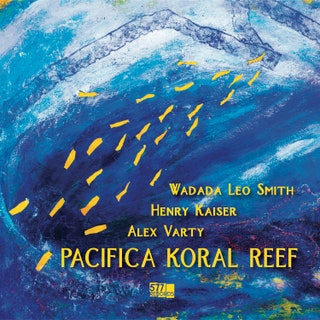Improvising on trumpet and two guitars, the avant-garde composer and his collaborators mourn the natural world while asking us to forget what we know about conventional musical hierarchies.
With abstract jazz, Wadada Leo Smith writes eulogies. Since 2012’s rapturously received Ten Freedom Summers, his records have memorialized Civil Rights heroes, musical legends, and America’s threatened landscape, bolstering the trumpeter’s compositions with history. The 80-year-old knows that what a country commemorates testifies to its character. But what it protects speaks louder: His monumental 2016 release America’s National Parks suggests expanding the safeguards of natural refuges to include havens for culture, such as New Orleans.
Smith’s latest, Pacifica Koral Reef, fits in with the scope of his past decade’s oeuvre, if not its sounds. He turns his horn to endangered coral reefs, which the U.S. and other countries have been sluggish to defend from climate change. While Smith’s a true conservationist, the thematic focus is reinforced by his two younger collaborators, inveterate improviser (and scientific diver) Henry Kaiser, and Canadian music journalist (and amateur diver) Alex Varty, who plays the guitar as though it’s his full-time job. Using a score Smith wrote in his own visual-musical dialect, Ankhrasmation, they provide a transformative 55-minute tour through acoustic drones and outboard distortion, sporadically awash in the sparse, Miles Davis-inspired phrasing that’s always been Smith’s bread and butter.
The record is a revelation for all three musicians. Varty, who’s previously played in alt-rock bands, shows himself to be a soulful, supple improviser of Indian raga, strumming unaccompanied for the album’s first 10 minutes. Kaiser, who has collaborated with luminaries from Terry Riley to Herbie Hancock, achieves a delicacy of effects and engineering that echoes David Torn, and Smith’s overdubs demonstrate his flair for gentle, almost ambient soundscapes. The unusual trio setup—two guitars and a trumpet—encourages us to forget what we know about genre. Is this jazz? Classical? Or—god forbid—“world music”? And what, exactly, is the difference? After all, avoiding labels and hierarchies is integral to the philosophy behind Smith’s score.
A portmanteau of three words, Ankhrasmation, Smith says, is “a language, not a notation system.” It consists of works on paper, paintings as much as musical instruction, full of bright pictographs that propose ambiguous sets of rules. Colors and representational shapes are open-ended, prompting musicians to ponder both their personal experience and broad concepts such as science. Tempo is marked more ordinarily, as a dynamic of slow and fast notes that increase unconventionally in “density level,” or how much noise fills the composition. These guidelines slyly limit the egos of both performers and composers, letting the former extemporize, but only within boundaries. The players interpret the art as though they’re writing ekphrastic poems with music. They, too, become the pieces’ authors.
We can hear Smith’s score in Pacifica Koral Reef’s languid, thoughtful pace, which quickens when Kaiser and Varty trade blues riffs. It’s audible, too, in the album’s abundant space, the ways that luxurious fits and starts split the single-track piece into something like movements, and in the wide gulfs between the three musicians’ tones: Kaiser’s sculpted feedback, Varty’s acoustic picking, and Smith’s mournful horn are all deeply individual, while working together toward a cohesive composition. The result unsettles the idea of a band leader. Each player cues the others, running a relay race of instrumentation, swirling toward a center that doesn’t quite exist. And why should it? Centers are tricks of perspective. All roads never led to Rome, and the U.S. isn’t the nucleus of the 21st century, either. The very form of music like Pacifica Koral Reef subverts this faulty solipsism.
Such a concept isn’t new, and neither is the core of Smith’s indeterminate scores—he owes a debt to John Cage, among others. But Ankhrasmation allows for commentary, which so much of the avant-garde from Smith’s generation and earlier eschewed in favor of process. With its gorgeous, contemplative interplay of instruments, Pacifica Koral Reef lets itself be a swan song for our ailing environment, and while some may find this topicality pretentious or an easy marketing narrative, examining the outside world is built into the frame of Smith’s musical practice. It’s also human: In our time of desperation, suffering, callousness, and uncertainty, fear about the future can’t be considered an imposition on creativity. For Smith, Kaiser, and Varty, concern lives alongside music. We may not be able to pinpoint it in the sounds they make, or label it with the literal language we’ve learned to use, but the earth wails to them, and they reply, “I hear you.”



0 comments:
Post a Comment